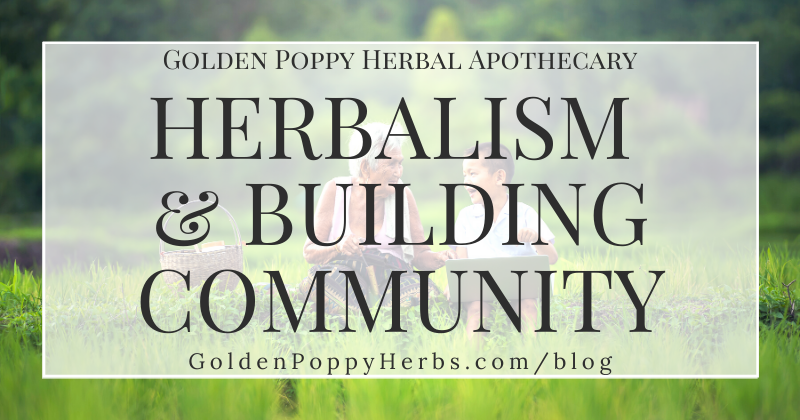
Did you know that the largest living organism in the world is not any sort of animal or creature? Yes, the organism is even larger than a towering elephant or the great blue whale that explores our vast oceans.
It is actually a forest.
Based in Utah, there is a grove of quaking aspen trees, come to be known as Pando, that are all connected, have lived to be over 80,000 years old, and that weigh over 6,615 tons. The number of trees that make up this expansive forest is 47,000, and they all share a single root system.
Which means, though they appear to be individual trees that are spread out over 107 acres, they are in fact, one organism.
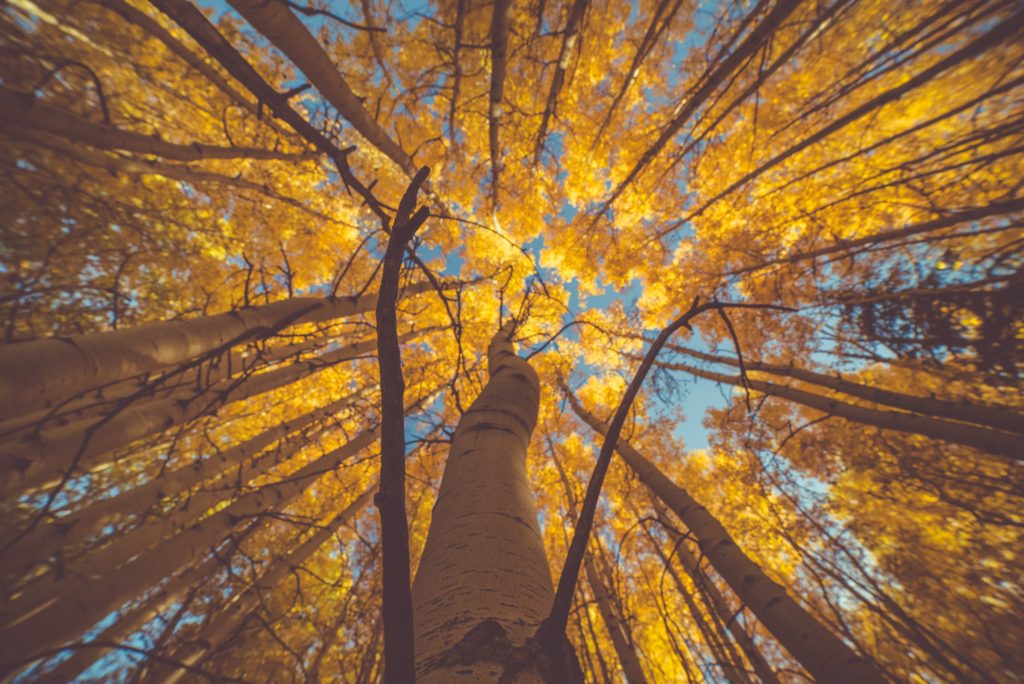
As we talked about in last month’s post, nature has a way of teaching us how to be resilient, and oftentimes, this lesson is that we are the strongest when we come together.
A single aspen trees typically live to be about 150 years old on average, with an outlier here or there possibly living to be 200, but Pando has lived to be 80,000 years old. We would like to think that the reason for this is that there are so many regenerations of this single tree, or that Pando has essentially built a community of itself. The creation of this expansive network allows for support to be spread out to all parts of the grove – if one of the trees start to wither, become diseased, or is struggling for any reason, it has the full support of the rest of the forest to help it recover, receive the resources it needs, and more.
We are much stronger when we are a part of a collective than trying to go it alone.
Was Herbalism Always a Solitary Practice?
For many groups and traditions, herbalism was never a solitary practice, but a communal one. This may be particularly true for the women of the group, as traditionally, they were the keepers of the home, midwives, and family healers. They were who the community turned to when it came to the health and vitality of their families and neighbors.
This knowledge was not held by a single member of the community; this knowledge was gathered, collected, and held together in circles. There was vast support and encouragement integrated throughout the entirety of the community to ensure the knowledge was maintained throughout generations.
The persecution of those who practiced plant medicine or herbal healing throughout the ages lead to the disruption of these close knit bonds. Instead of a collective space in which people could gather together to heal and learn from each other and pass this knowledge along to the next generation, people were pitted against one another, separated from the collective, which formed long threads of distrust in communities that would endure for centuries.
This type of practice, of singling out and destroying members of a group, usually women healers, made others fearful of exposing their own knowledge, and thus much of what they knew was not passed on and was lost.
This historical context helps us understand how herbalism has become more of the solitary practice it seems to be today; where a handful of people in the community have an understanding of these traditional practices. Though this is not the way it has to continue to be.
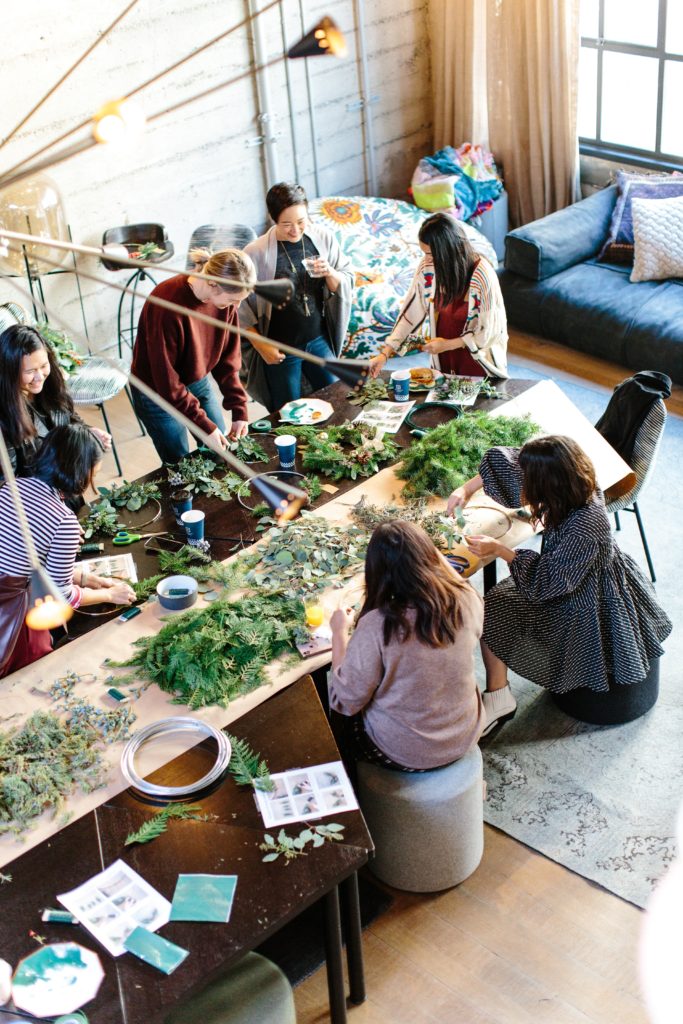
Building Community as a Way to Heal
There is a beautiful philosophy that comes from the times of Ancient Greece that states, “live as though your ancestors were again living through you.” Perhaps ask yourself what kind of world your ancestors would hope for you. Would they want us to be practicing as individuals, or would they want us to be a part of a supportive network, lifting one another up, the way things used to be? How can we use the practice of herbalism to begin this process of healing and bring back a culture of building connections in our community?
Move Away from an Isolationist Mindset
We must adopt a community-centered way of thinking. For many of us, the culture we have been raised in is one of the isolationist/individualistic mindset. This mindset perceives life as and it’s resources as finite; it causes us to feel that we must fend for ourselves in times of adversity, to look out for “number one” above all others.
However, when things in life get rough, the lesson we hopefully have learned is that this is the opposite of what is helpful. If we look at major disasters across the globe, the communities that recovered the most quickly were those that banded together to help one another survive. Much like Pando, if you have a network in which to reach out to for needed resources, to find support from, and to grow from, it shows that you can last centuries.
Create Communal Space
If you are called to the plant path, or are in the process of your own herbal journey, are you doing it in a way that you would consider to be solitary, or are you finding ways in which you can build community along the way?
What made plant medicine so incredibly sacred to those who came before us was the very concept that this knowledge was not supposed to be held by any one person, but shared.
This can be as small as sharing your favorite herbal book with others or perhaps you invite your neighbors and friends to your home for a day of herbal medicine making. Maybe you volunteer at your local community garden, and share your knowledge of growing herbs that are special to you! There is a multitude of ways in which you can create space that allows for others to not only join you and support you but share your enthusiasm and help to pass along this important knowledge to others.
Support Local
There is no doubt that the internet is a marvelous thing. Because of it we have the ability to obtain abundant and infinite herbal resources and information at our fingertips. We have access to hundreds of classes and online stores to purchase from. However, you may have access to this very same treasure right within your own community.
Many local apothecaries have all of the herbal resources available you can find online, and even offer regular herbal classes and workshops (Matter of factly, you can check out the list Golden Poppy is currently offering here)!
By supporting local, not only do you help ensure this resource remains open and available to your friends and neighbors, but it will also be a place to meet others who share your passion for the plants and can help you cultivate a deeper sense of belonging and shared knowledge.
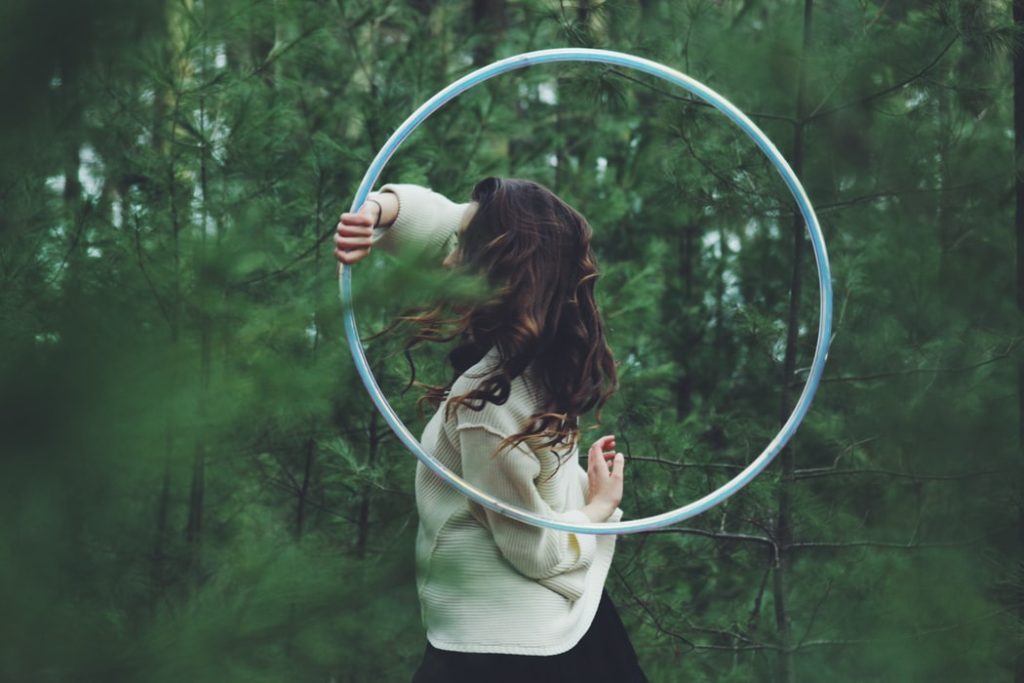
Support Herbal Communities/Practitioners/Businesses that are Working Toward Rectification
It is particularly important, especially in Western Medicinal Traditions to understand that there are a multitude of indigenous and cultural practices that influenced, contributed to, or are the foundation for a lot of the herbal knowledge we know and understand today.
However, as pointed by herbalist Regina Kankinza of In Her it Blooms (@inheritblooms on Instagram) unfortunately, in a lot of spaces, this acknowledgment is not recognized or celebrated or is even erased, and thus forgotten. If we truly want to build a community, we must do so in a way that does not allow for marginalization, but in fact amplifies and support the traditional people who practiced it. It’s crucial that the herbal community supports herbal practitioners and businesses that elevate the voices of and give proper credit and acknowledgment to the herbal traditions that were the foundation of the medicinal practices we learn about today.
Thank you for joining us in this discussion today, and thank you for being part of this community. At Golden Poppy, we truly think of ourselves as a community space and a community resource. The concept of togetherness is so incredibly important, not only as we work to amplify the voices and experiences of those who have been marginalized in our community throughout history, but also as we emerge from an extended duration of isolation. We need one another. Continue to support, uplift, and engage. We are stronger together.
Resources:
- Atlas Obscura. “Pando, the Trembling Giant.” Atlas Obscura. 2020. https://www.atlasobscura.com/places/pando-the-trembling-giant
- Natural Magic. “Herbs/Oils Associated with Friendship.” The Living Spellbook Blog. 1 February 2013. https://thelivingspellbook.tumblr.com/post/77156393051/herbsoils-associated-with-friendship
- Ehrenreich, Barbara & English, Dierdre. “Witches, Midwives, and Nurses: A History of Female Healers.” The Feminist Press. 1973.
- Kankinza, Regina. [@inheritblooms]. Racism in the herbal community – are we ready to address it? 5 June 2020. https://www.instagram.com/tv/CBD6FF5A9Le/
- Smith, Jacki. “Coventry Magic with Candles, Oils, and Herbs.” Wieser Books. 2011.
- U.S. Forest Service. “How Aspens Grow.” United States Department of Agriculture. 2020. https://www.fs.fed.us/wildflowers/beauty/aspen/grow.shtml#:~:text=Aspen%20trees%20usually%20do%20not,persist%20more%20than%20200%20years.
- Mother Earth Living “Victorian Tussie Mussie: Glossary of Herbal Sentiments” https://www.motherearthliving.com/gardening/glossary-of-herbal-sentiments
Browse by category
- Aromatherapy
- Astrology & Magic
- Ayurdeva
- Botany Foraging & Gardening
- Chakras
- Digestion
- Earth Connection
- Energetics
- Flower & Gem Essences
- Folk Traditions
- Herbalism & Holistic Health
- Immune Support
- Materia Medica
- Mushrooms
- Nutrition
- Seasonal Living: Autumn
- Seasonal Living: Moon
- Seasonal Living: Spring
- Seasonal Living: Summer
- Seasonal Living: Winter
- Skin & Body Care
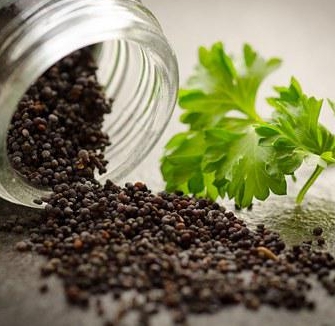
Don’t Miss a Thing!
Enter your email below to be the first to know about sales, new products and tips for taking care of your pieces.

